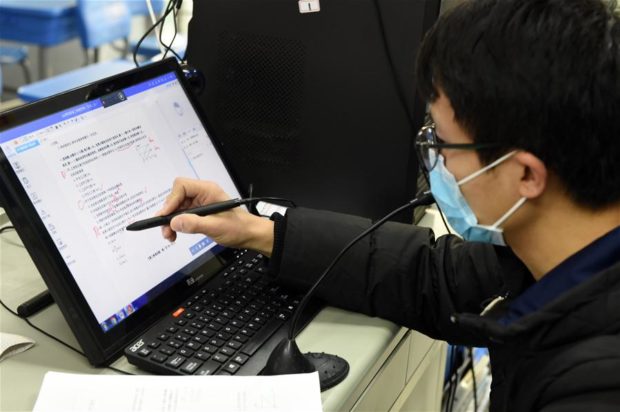Working from home amid outbreak brings unexpected challenges

Physics teacher Li Wenzhi gives an online tuition to students at Hefei No Eight Senior High School in Hefei, East China’s Anhui province, Feb 3, 2020. [Photo/Xinhua]
BEIJING — Working from home has been a long-held dream for many employees craving more flexible work arrangements and comfort. With the fantasy coming true thanks to the novel coronavirus outbreak, however, quite a few people find it less romantic than expected.
Amid the ongoing epidemic, a large number of Chinese companies have ordered employees to work from home, looking to curb the spread of the virus as staffers return from the Spring Festival travel rush.
Bytedance, the owner of video-sharing site Douyin, has requested employees traveling during the Lunar New Year break remain at their destinations for the time being and work from home. Chinese e-commerce leader Alibaba took similar steps, as did search engine provider Baidu.
“It’s necessary businesses take steps to plan for the possibility the outbreak worsens and protect their employees from getting infected in the workplace,” said Zhang Chewei, head of the Population and Labor Economics Research Institute at the Chinese Academy of Social Sciences.
Allowing employees to work from home — even if they are not symptomatic — and enabling virtual meetings could help limit the spread of the virus and assuage employee fears about exposure, he added.
Article continues after this advertisementBut there’s another side to the coin.
Article continues after this advertisementAs millions of people started to work at home, people found video communication difficult. Many telecommuting platforms, including DingTalk, an all-in-one mobile workplace from Alibaba, went through temporary outages due to surging demand.
Fu Yangang, a product manager at a house trading company in Beijing, found he couldn’t receive any messages from colleagues during an online meeting at home on Tuesday, and neither could they. Similar problems arose when they switched to Zoom, a California-based video communication app which provides remote conferencing services.
“We even considered using WeChat, but it only allows nine people online at the same time,” he said. “Thanks to a colleague who likes to watch video game livestreaming, we finally made it happen on the live-broadcasting platform YY with his recommendation.”
To support this unprecedented demand, companies like Dingding immediately added more cloud servers to ensure functionality for video conferencing, group live broadcast and office collaboration.
Residences filled with distractions such as spouses, parents, kids or pets set up another obstacle for many employees working from home.
Xia Baiqi, who works for an internet company in Beijing, was required to stay home in Jilin province until Feb 10, but has found what was an oft-wished for working style a hindrance to productivity.
Her parents, who don’t have much to do, suddenly became concerned about her job and asked many questions. They look to chat from time to time, thinking working from home really just means an extended holiday.
“I love my mom and dad, but their current behavior just adds stress and strain,” she said. “Sometimes I have to lock myself in my own room to avoid their enthusiasm.”
For people who are able to stay as productive as they would in an office environment, they came across a different problem: “surprisingly” longer working time at home.
Working for an investment company in Shanghai, Zhang Fei felt he could never escape from his job working at home in Shandong province, which makes time management a whole lot messier.
At 6 pm on Tuesday when Zhang was about to cook himself dinner, a video call from his boss stopped him from chopping vegetables. After talking for about an hour, he was too hungry and tired to make anything and ate instant noodles instead.
“There is no longer a ‘work’ and ‘no work’ time. My work comes calling at all hours, which can keep me at a frenetic pace,” he said. With the return date drawing closer, he said, he never felt so excited about being back at the office.